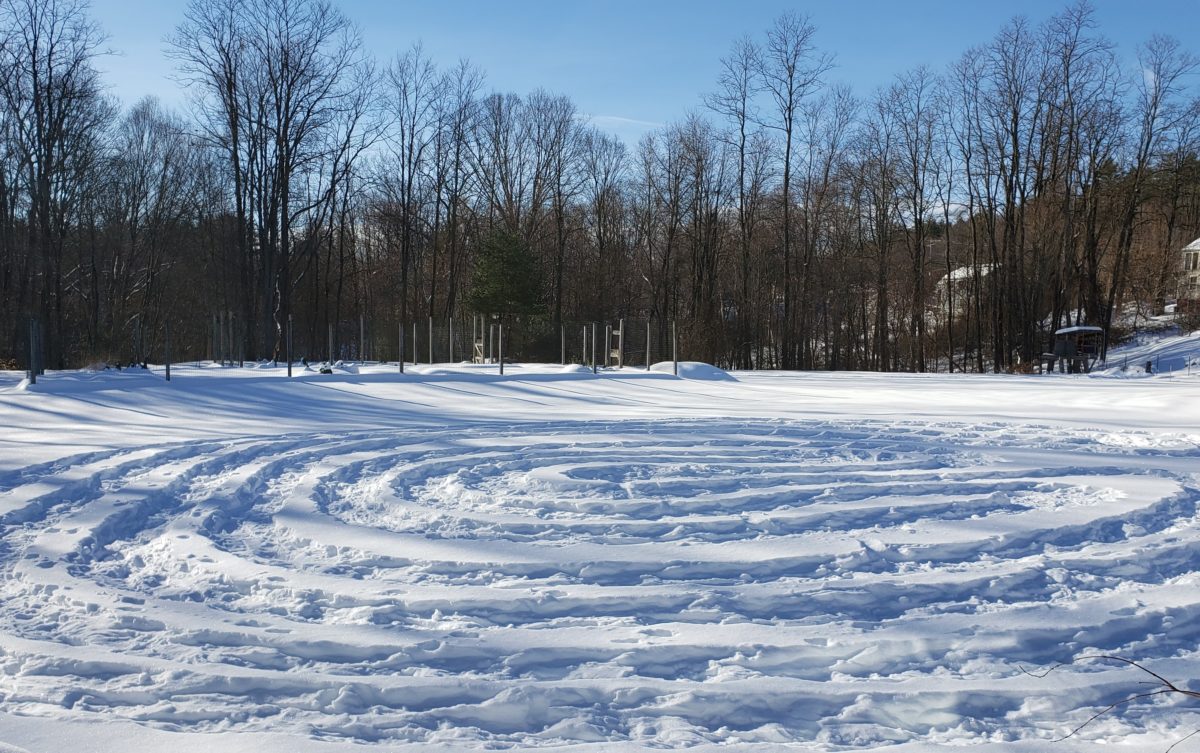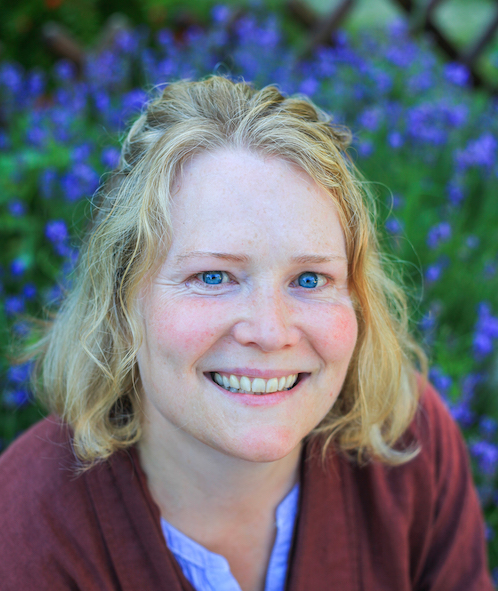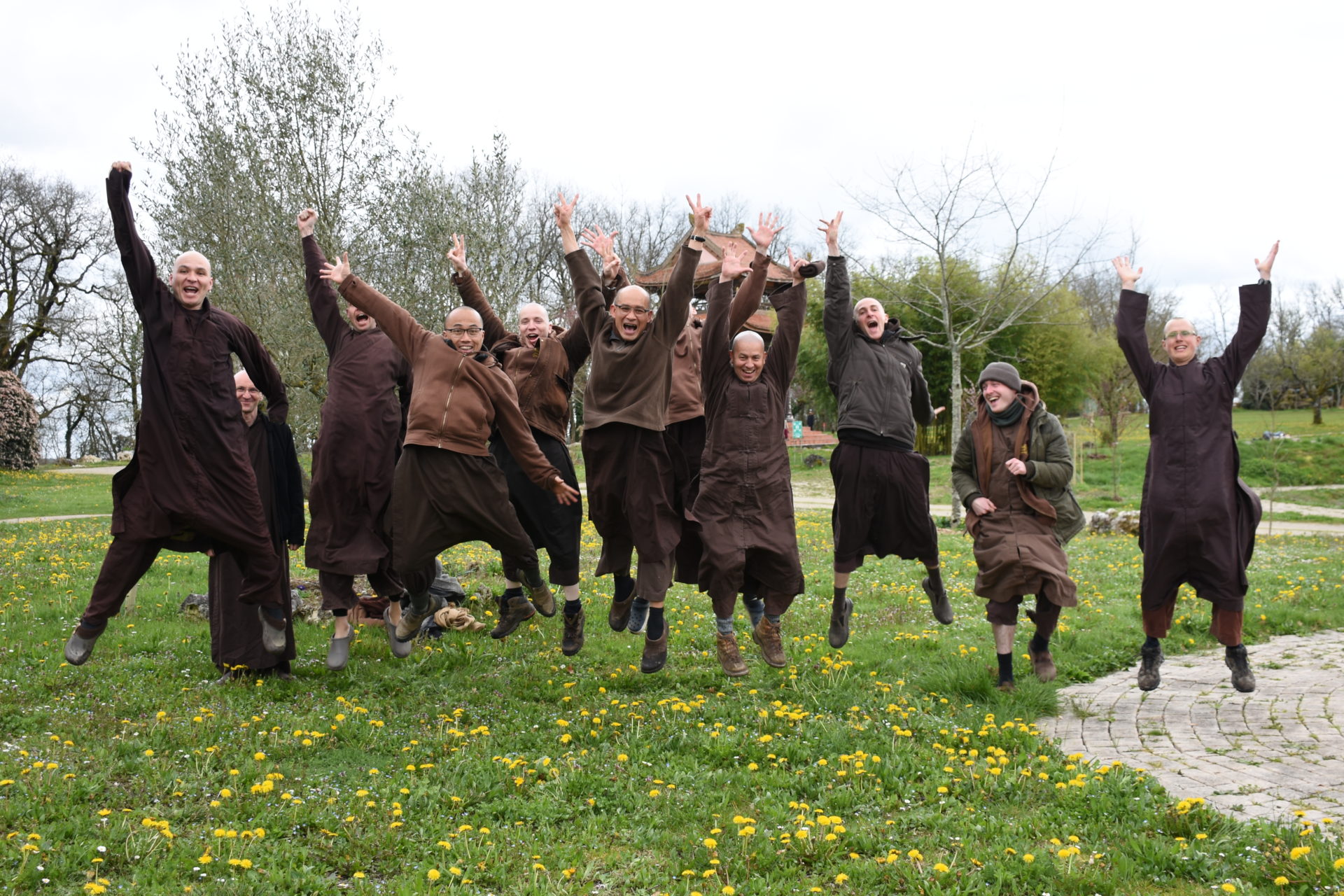By Orla O’Sullivan

“Building a Sangha is a very basic practice. If you have a deep aspiration, or a dream to realize, you cannot do it without a community. That is why building a community is very important.”
Thich Nhat Hanh spoke these words during a question and answer session at a retreat for educators in Barcelona, Spain in May 2014. His emphasis on how crucial it is to take refuge in Sangha is deeply embedded in the vision of Wake Up Schools.
By Orla O’Sullivan

“Building a Sangha is a very basic practice. If you have a deep aspiration, or a dream to realize, you cannot do it without a community. That is why building a community is very important.”
Thich Nhat Hanh spoke these words during a question and answer session at a retreat for educators in Barcelona, Spain in May 2014. His emphasis on how crucial it is to take refuge in Sangha is deeply embedded in the vision of Wake Up Schools. Indeed, it is the third pillar that upholds our work (the first and second pillars are embodiment and service). Without taking refuge in a Sangha, how can we hope to create a classroom that feels like a community or a second family?
On Saturday, 2nd of January 2021, Wake Up Schools celebrated a joyful blossoming of community: our first meeting of the new Happy Teachers Sangha. The online gathering was supported by Dharma teacher Richard Brady, who led us in a beautiful meditation where we walked a snowy labyrinth together. The Sangha was also supported by Dharma teacher Hélène le Bris and Level Two Happy Teachers. For some educators, it was their first time participating in a Sangha. Dave Temkin, a school social worker in Chicago Public Schools, recently shared his experience with me about learning to take refuge in community and the insights it has offered him.
“I was a nurtured student. I was born out of a school system that supported students beyond just education. I grew up in a community where teachers were happy and giving. My fondest memory is of my third-grade teacher Mr. Lyons, who transcended being a teacher. It was at a time when my family was falling apart: I lost my mother, and then I lost my sister. I remember Mr. Lyons built a balsa wood flying aeroplane with us. I’ve never forgotten that, because it was so meaningful and real to me.
“In 1999, I started with Chicago Public Schools as a social worker. I found myself in Englewood, which at the time was one of the worst neighbourhoods in Chicago. I saw the condition of the school and how the kids were being treated, and I recognised that this was not right. I did everything in my heart to bring joy to people and listen to people’s suffering.”
From early in his career, Dave has cultivated deep listening. “I remember being in a room with other clinicians and other staff, and holding the phone away from my ear, because the person I was talking to was yelling. My colleagues looked at me and said, ‘Why do you let them talk to you like that?’ I said, ‘They’re not really talking to me. They’re venting. I’ve got to let them get out
their suffering, and then maybe they’ll hear what I have to say.’ That’s always been my practice. I’ve always tried to listen to people carefully, let them know that I see them, and I hear them.”
Throughout his career, Dave continued to search for things to “hook kids into some joy,” from teaching kids how to play hockey to snowboarding and beyond. “I’ve taught kids to be givers in nursing homes and be peer mediators. Those are some of the big joys I’ve had in my career.”
The success of an experiment helping kids to work with positive, loving statements convinced Dave that the practice could be transformative and that he needed to start with embodiment. “I realised that in order to share with others, I needed to immerse myself in the practice and really get a sense of it.”
Dave learned about meditation, presence, awareness, and equanimity with an app. He discovered the practical tools he had been craving. “As a clinician, I have always been told what the problem is: this is what ADHD is; this is what PTSD is; this is what depression is. I’ve always sat in those trainings, wanting
something practical to work with.”
He found the teachings of Thich Nhat Hanh and the work of our organisation, Wake Up Schools. Dave also discovered the close connection between the Plum Village tradition and the Chicago organisation Rainbow Push, which has been a spiritual refuge for him. Rainbow Push was founded by Reverend Jesse
L. Jackson, Sr., and works for social change, civil rights, peace, and justice. “When I learned about that connection, it seemed like divine intervention,” said Dave. “I thought that I’ve got to start absorbing this stuff.”
In November 2020, Wake Up Schools spoke with Dave about our work and approach, and encouraged him to find community in order to support his practice. “Then one morning, I was sitting with my intern and shared this information with her. She searched online and said there was a retreat at Magnolia Grove Monastery at the New Year. I said, ‘Sign me up!’”
When he saw the daily schedule, Dave had a concern that the retreat might be arduous. The fear quickly dissipated. “From the moment I entered the retreat, there was such a sense of calm, peace, warmth, and comfort. Day after day, I felt an excitement to get to the next practice, be with the community, and be embraced by the community. Over that extended period of time, I was moved
to tears on several occasions, but I went to bed every night with an overwhelming sense of calm and comfort. That is something
I’ve never experienced in that magnitude.”
While on retreat with the Magnolia Grove Monastery community, Dave was also inspired to receive the Five Mindfulness Trainings. “Receiving the trainings wasn’t even a question for me. They felt more like a calling, as my official connection to this community. Each of the five teachings spoke to me, and many
were processes I had gone through on my own. For example, I cleansed myself of toxins and meat some years back, and this is from someone who used to compete in barbecue. All the teachings were like that and offered me the chance to make a commitment to the life I want to lead.”
At the transmission ceremony, Dave was given the Dharma name Loving Speech of the Heart. The name brought him to tears. “The Magnolia Grove retreat was my first formal education; it caused my cup to overflow. And then Happy Teachers was my first Sangha.”
Fifty-five teachers joined the first online Happy Teachers Sangha gathering from around the world, including from North America, France, Germany, Ireland, the Philippines, and United Kingdom. It was a moving experience for Dave to practice with so many other teachers. “It was so inspirational. Having been on a personal journey of love and compassion, and being in service to others, it’s been a lonely journey for me. To be part of a Sangha with teachers and like-minded individuals all over the world was inspirational. I felt like I was home.”
These days, Dave leads a half-hour practice with 150-200 kids each week. From the outset, he was interested in measuring the young people’s response to meditation. “I’ve always been told: data, data, data.” Using a simple scale from one to ten (worst to best) students identify how they feel before practicing and afterwards. “The shift from five and under to five and over was remark-
able. It was crystal clear that kids were impacted by meditation.”
He also added a quantitative question about mindfulness. With over 600 entries, Dave has an insightful glimpse into the meaning of a mindful practice to these young adults. “I have a lot of entries. Some are rich about what mindful practice has meant in their lives. For example, one kid said, ‘Now when I’m angry, I
know I can go into the bathroom and do my breathing and it helps me to calm down.’”
Dave’s sense of being home is bringing deep nourishment to him. “I don’t think in my life that I’ve ever felt such a connection to community. There are so many people who are thinking the same way that I’m thinking, which is a simple way of thinking that we’re all in this together, and that compassion and love are what
will drive us to succeed beyond our wildest imaginations. This is the life I chose to lead: one of love and compassion for myself and others,” Dave reflects. “And I think for me, it came the other way round. First, it was love and compassion for others. Now, this practice has taught me to have love and compassion for myself.”
As our beloved teacher teaches us: to take care of yourself is to take care of the whole Sangha. We are not separate. May our practice continue to dissolve separation and help us to live and work together with understanding and love.

Orla O’Sullivan, True Garden
of the Nectar of Immortality,
is the international coordinator
of Wake Up Schools. She is
based in Dublin, Ireland.

